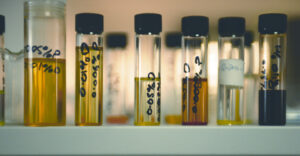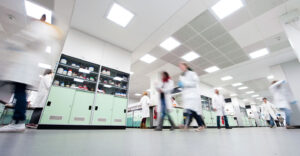A Second Year Chemist’s Guide To Labs
Student experience 19 September 2017
Experiments, you either love them or you hate them. Now you have to do a whole day of labs every Monday, chances are you’ve never done anything like this before and you feel like you’ve been thrown off a cliff. So, if you’re reading this and you have no idea what to expect from labs, or have no idea what is expected of you, or you’re simply curious about what labs is like then I hope I can answer your questions.

My name is Beth and I’m in my 2nd year of an MChem with Industrial Experience and I’m a PASS leader for 1st year students. I enjoy athletics and like to watch rugby league. My favourite types of chemistry are organic and inorganic chemistry and I find it really interesting to see how chemistry is used in the pharmaceutical industry.
What are labs for?
A lab every Monday may seem excessive but there is no way around it, a chemistry degree requires lab time. Some of the labs you do will be tedious, some will be long and some will be short and some you will enjoy. One thing is certain the first few will be extremely hard and you may regret ever wanting to do chemistry or think labs will never be your thing but you must persevere, it will get easier and you can get a good grade!
Tips for labs
-
- Wear comfortable clothes and shoes – You’re going to be on your feet a lot so you need to be comfortable, you also mustn’t have any skin showing so avoid ripped jeans and ankle socks!
- Try and understand the method and theory beforehand – At the start chances are you don’t know what half the things in the method mean and don’t get or don’t care about the theory and you just want to get through the lab and that’s perfectly okay! However, as you start to progress through your first year of labs it will make labs much easier if you have some understanding of what is going on before you turn up.
- Have the right equipment with you – You will obviously need your lab coat and safety glasses (these really hurt your ears and head after a few hours), your lab book and lab manual and a pen, but you should also think about taking a calculator and a permanent marker (to

Don’t forget a permanent marker to label your glassware write on your glassware so you know what’s in it), a padlock is also handy if you have anything valuable that you want to keep safe.
- Ask questions – The demonstrators in your lab are there to help you out, sometimes they may not be all that helpful but there’s no harm in asking.
- Prepare – The more preparation you do before your lab the easier it will be. Read all the available content, answer all the questions and prepare your lab book. Not only will this make your day in the lab easier you will also get a better mark.
- Make friends with your lab group – If you get to know your lab group you can help each other out in the lab and have a chat and laugh to help pass the time and make labs much more fun and enjoyable.
Preparing for the lab
- Read the Introduction & Theory document on Blackboard – This should provide you with an understanding of why you are doing the experiment and tell you about anything you need to do or consider during your experiment.
- Prepare your lab book – This is going to seem really tedious at first and you might feel like you haven’t got a clue what to write but fear not it will become second nature to you. The two labs require different lab book preparation but both start with the title, date and aims and objectives. Then you write down the reaction scheme, there will almost always be a reaction scheme for the synthesis lab but not always for the measurement lab. If you have a synthesis lab you will then need to add a reagents table, this table has 5 columns; reagent, mass/volume, Mr, moles, equivalents (molar ratio). For both labs, you then need to answer the questions in your lab manual for that experiment. For a measurement lab, you may then need to draw tables for your results to go in, units must be written alongside the heading of the column, for example, volume/cm³ NOT volume(cm³).
- Fill in and sign COSHH form – Some of your COSHH forms may be completely filled in, others you may need to fill in certain parts such as the quantity of each substance or the precautionary measures for other hazards in the experiment. Read the hazards associated with the substances you are using, it’s good to know what the most dangerous thing you’re working with is.
- Have an aim for where you’ll get up to before lunch – Try and stick to that aim but don’t worry if you don’t make it! When lunchtime comes around go and get some food and drink and rest your feet so you’re ready to go after lunch.
During the Lab
 Method – As a chemist it’s very important that you write down your method so someone else would be able to copy it and reproduce your results. In your first year, you’ll probably only need to write down the method in the synthesis lab, so you would write down what you did and at what time you did it.
Method – As a chemist it’s very important that you write down your method so someone else would be able to copy it and reproduce your results. In your first year, you’ll probably only need to write down the method in the synthesis lab, so you would write down what you did and at what time you did it.- Weights – Write down all the weights of things in your synthesis lab because you will forget them if you don’t, trust me I made that mistake!
- Calculations – Write down any calculations you make, you often get marked for these.
- Clean, tidy and organised – It really helps to label all your glassware and tidy things up when you’re done with them as you only have a limited space so you don’t want to mix things up or knock things over. Mistakes and accidents do happen though so don’t worry if things go, wrong members of staff and your demonstrators will help you sort things out!
- Safe – The most important thing is that everyone stays safe and goes home in one piece, just listen to any safety instructions and if you’re not sure just ask!
Good luck with your first year of labs, by the end of the year it’ll all be second nature to you!


Leave a Reply